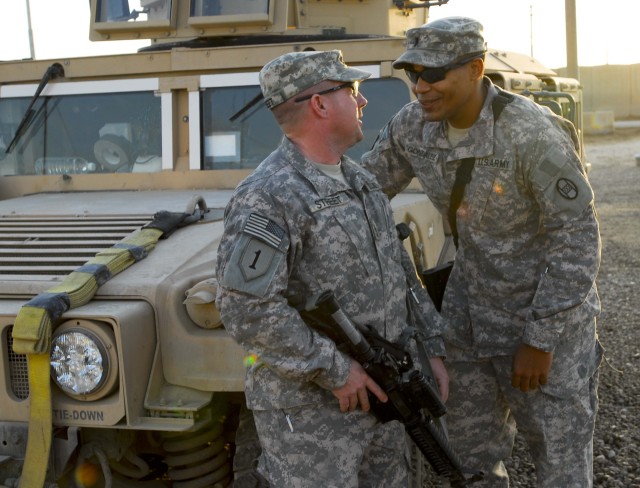
BAGHDAD - "Contact... contact..."
The warning blares from the computer speaker as 1st Lt. Carlos Gonzalez, of Greenville, N.C., and Sgt. 1st Class Mike Street, of Charlotte, N.C., prepare for a shift change brief in the 150th Armored Reconnaissance Squadron tactical operations center.
The computer alert, which informs Gonzalez and Street of incoming intelligence in the area of operations, constantly interrupts as they discuss the challenges and privileges of being transferred from the North Carolina battalions of 30th Heavy Brigade Combat Team to the West Virginia squadron at the start of the 2009-2010 deployment.
When National Guard members deploy, Soldiers fill mission essential roles throughout the brigade and may be transferred into different sections or battalions as missions require.
"I was told five days before coming into country that I would be transferred to the 150th", said Street, a fires support noncommissioned officer. "Although it was hard to gauge in the beginning; it ended up being a good thing."
"It was a smooth transition," said Gonzalez. "I was pretty nervous at first because this was my first post, but they welcomed me with open arms."
Gonzalez received orders to deploy with the 30th Brigade Special Troops Battalion five days after he graduated from the military intelligence officer's course in December 2008. He linked up with the battalion in January to assume the position of executive officer at Headquarters and Headquarters Company.
Three days later Gonzalez was transferred to the squadron as a battle intelligence coordinator. He is the assistant to the intelligence officer, the squadron intelligence surveillance reconnaissance manager and provides assets such as radio-controlled airplanes for squadron missions.
"My main job is to assist [Major Bruce Campbell, the intelligence officer] and request assets to support squadron missions," said Gonzalez.
Gonzalez may assist the major but he works side-by-side with Street. Together, they collect and analyze information to reduce potential threats. The two, along with the help of Soldiers in their sections and the tactical operations center, have devised a system to deter crime.
They have developed packets to deter improvised explosive placement and indirect fire on the base; something they didn't have coming into the area and a valuable asset for the unit replacing them.
"There has been a decrease in [improvised explosive device attacks], indirect fire, rocket and mortar attacks deployed against us compared to the unit before us," said Street. "IEDs have gone down 60 percent in our area of operations.
"I attribute this to the guys I work with because we didn't have a foundation coming in," he added. The previous unit had worked out of one of the other battalion areas.
The intelligence section, fire support and operations used a multi-faceted approach to reduce threats in their area of operations, said Gonzalez.
Gonzalez and Street have become a part of the 150th team, meshing cohesively and setting a standard for others to follow. They were the only two Soldiers transferred into the squadron from the more than 4,000-man brigade and they have been asked to remain with the squadron when they return home.
"The two have transitioned in well," said Capt. Scott Bossie, of Charleston, W. Va. "You would never know they joined up with us here. They fit right in; like family.
"We have had the most illumination missions in the brigade and more aerial weapons team assets per troop," said Bossie. "Street coordinates all of this and the work that he and Gonzales have done saved Soldiers lives."
"It's been a good experience," said Street. "I actually got to work in my [trained military occupation,] doing fire support missions, and I may not have been able to do that if I stayed with 252nd Combined Arms Battalion."
"The 150th is a great unit and I feel like we made a significant impact and contributions to Operation Iraqi Freedom," said Gonzalez. "I met a lot of good people.

Social Sharing